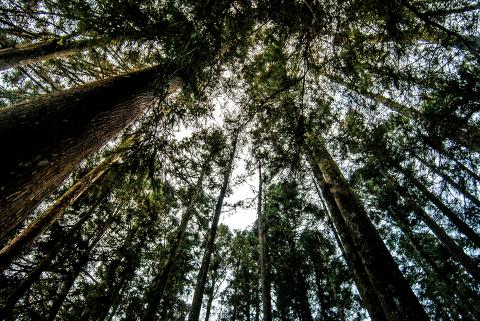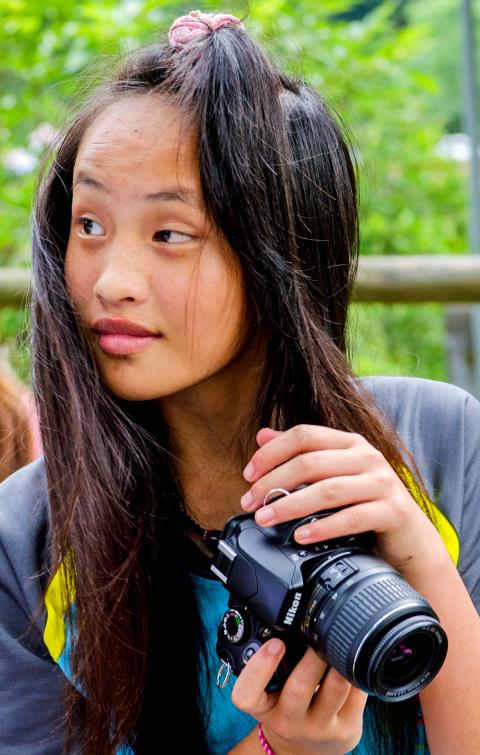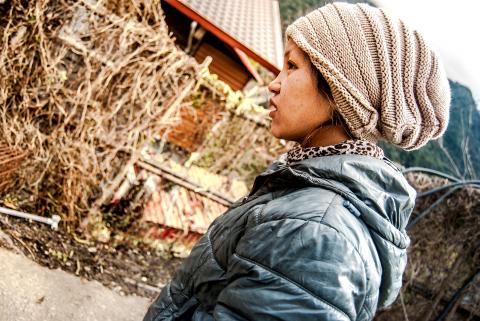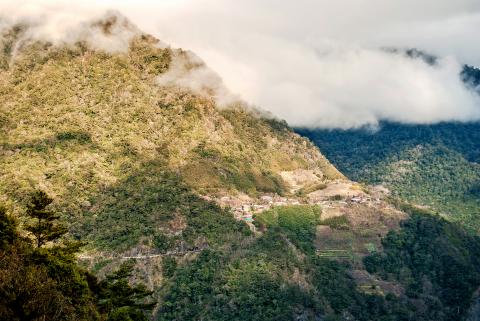Despite her initial dream of becoming a model, Tapas or Chang Ling-hsin (張凌馨) is a 14-year-old girl who is not obsessed with taking duck-face selfies. Armed with her Nikon D60, she focuses her 18-55mm lens and snaps a few shots of schoolchildren playing basketball outside of her old school, Taoshan Elementary School (桃山國小). The court overlooks the fogged-covered mountains of her hometown, an Atayal village called Chingchuan (清泉) which is near Hsinchu.
Her camera was a gift from Australian photographer Jonathan Burke, a long-time Taipei resident who regularly volunteers at the school. He gave it to Tapas in January after noticing her experimentation with angles and perspectives on her cellphone camera. Since then, Tapas has been photographing scenes from Chingchuan to submit to the Makapah Arts Award for images depicting Aboriginal culture.
CHALLENGING STEREOTYPES

Photo courtesy of Tapas
Despite her youth, Tapas understands the stereotypes people have of Aboriginal people and hopes to challenge those negative perceptions through her photography.
“I don’t feel oppressed or marginalized at all, which is how people might expect us to feel,” she said.
Aboriginal culture is often filtered to cater to the needs of tourists, especially in the form of costumes, dance and music. Tapas’ pride in her Atayal culture is evident in her pictures but in a different and subtle way. Her portraitures capture everyday life in Chingchuan from special occasions like birthday gatherings to friends having a chat. The message she wishes to convey is that Atayal people do the same things other people do.

Photo courtesy Jonathan Burke
“Each shot that I take captures the emotion I am feeling at that moment, whether it is happy, sad or frustrated, so while the pictures tell my own story, anyone can relate to them because life is about experiencing all these various emotions,” Tapas said.
Although her message is universal, Tapas’ love for Chingchuan is obvious. Gazing into the same mountainous backdrop, she talks about a picture she took of the fog resting on the trees after an argument she had with a classmate.
She says that “taking the picture really helped me to let go of the negative energy, and the feeling that other people glean from viewing it is also very peaceful.”

Photo courtesy of Tapas
FAMILY SUPPORT
Tapas’ family did not initially understand the meanings behind her photographs. She describes how they used to just look at them and say “great,” handing the camera back to her.
After seeing how dedicated Tapas has been towards pursuing this “hobby” though, her family, especially her mother, has been supportive of her decision to enter competitions and even pursue photography as a profession.

Photo courtesy of Tapas
This encouragement is important to Tapas since she is very close to her extended family. She calls her cousins “brothers and sisters,” and they are often the main subjects of her work.
Referring to a picture she took of her older sister playing the piano, Tapas says that if she had to write a caption for her photobook portfolio, it would read: “Everyone’s life is like a song and each song tells a different story.”
Tapas’ photography has caught the eye of Taipei-based foreign filmmakers who are working on a crowdfunding campaign on Fuudai.com to upgrade her lens to a Nikkor 18-200mm for a greater zoom function so that she can better tell her stories.
Tapas says she is still too young to decide her future. Although she adds that her mother believes photography is “at least a more practical option to pursue than modeling.”

Taiwan has next to no political engagement in Myanmar, either with the ruling military junta nor the dozens of armed groups who’ve in the last five years taken over around two-thirds of the nation’s territory in a sprawling, patchwork civil war. But early last month, the leader of one relatively minor Burmese revolutionary faction, General Nerdah Bomya, who is also an alleged war criminal, made a low key visit to Taipei, where he met with a member of President William Lai’s (賴清德) staff, a retired Taiwanese military official and several academics. “I feel like Taiwan is a good example of

March 2 to March 8 Gunfire rang out along the shore of the frontline island of Lieyu (烈嶼) on a foggy afternoon on March 7, 1987. By the time it was over, about 20 unarmed Vietnamese refugees — men, women, elderly and children — were dead. They were hastily buried, followed by decades of silence. Months later, opposition politicians and journalists tried to uncover what had happened, but conflicting accounts only deepened the confusion. One version suggested that government troops had mistakenly killed their own operatives attempting to return home from Vietnam. The military maintained that the

Before the last section of the round-the-island railway was electrified, one old blue train still chugged back and forth between Pingtung County’s Fangliao (枋寮) and Taitung (台東) stations once a day. It was so slow, was so hot (it had no air conditioning) and covered such a short distance, that the low fare still failed to attract many riders. This relic of the past was finally retired when the South Link Line was fully electrified on Dec. 23, 2020. A wave of nostalgia surrounded the termination of the Ordinary Train service, as these train carriages had been in use for decades

Lori Sepich smoked for years and sometimes skipped taking her blood pressure medicine. But she never thought she’d have a heart attack. The possibility “just wasn’t registering with me,” said the 64-year-old from Memphis, Tennessee, who suffered two of them 13 years apart. She’s far from alone. More than 60 million women in the US live with cardiovascular disease, which includes heart disease as well as stroke, heart failure and atrial fibrillation. And despite the myth that heart attacks mostly strike men, women are vulnerable too. Overall in the US, 1 in 5 women dies of cardiovascular disease each year, 37,000 of them